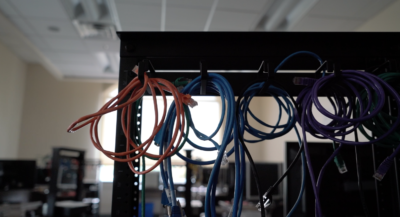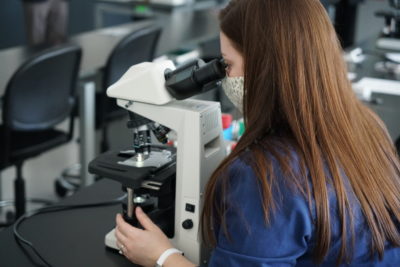|
|
Dr. Mark Sorrells is proud of the programs Fayetteville Technical Community College (FTCC) has to offer students.
“We’ve got a number of innovative programs and do a lot with our military community,” Sorrells said.
In fact, the college was included in the Viqtory national ranking list as a Top Ten Military Friendly School earlier this year. Located in the Sandhills region, the community college serves almost 30,000 students each year with curriculum, basic skills, and continuing education programs.
Sign up for Awake58, our newsletter on all things community college.
FTCC’s Spring Lake campus is located 20 minutes from Fort Bragg, and roughly 25% of the student population are members of the military community. Many are transitioning out of active duty and hear about opportunities at the college by word of mouth. They can receive industry-recognized certificates and “take classes to prepare them for the National Registry, which allows them to work in the civilian workforce,” Sorrells said. This foundational training will increase their chance of landing employment opportunities.
Sorrells takes the opportunities the college provides to the community very seriously.
“It is a fulfillment of our promise to serve those that so honorably serve to protect our freedoms and keep us safe,” he said. “I am proud to work at an institution that prepares active, transitioning military, veterans, and their families for success in civilian life.”
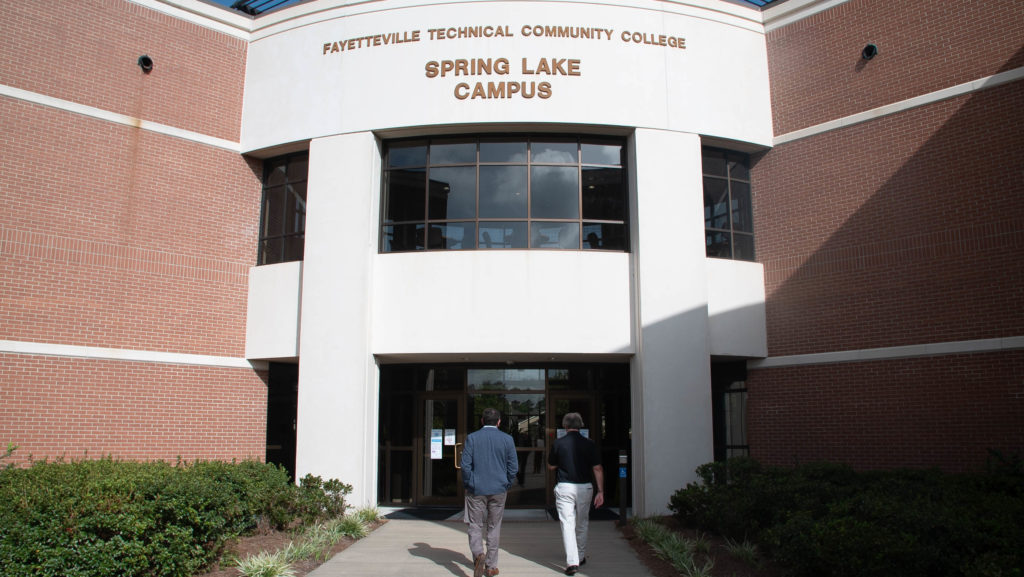
Anthony Ricciutti is a former non-commissioned officer (NCO) in the military and now works full time as a faculty member teaching welding. His time in the military and experience supervising fellow soldiers prepared him for life in the classroom. He says that the transition from military life to civilian life comes with challenges. While in service, they often teach and mentor fellow soldiers and miss the community after they leave.
“They don’t have that fulfillment. They don’t have that satisfaction,” he said.
He was drawn to welding because of the slow process and alone time. After he left the military, Ricciutti took a handful of welding classes, but it was the 16-week work-based learning program that FTCC offers that elevated him to the next level. He was invited to apply for a faculty position within the department as he wrapped up the program. The opportunity eased his transition back to civilian life. Ricciutti said that after the “go, go, go” pace of military service, he now enjoys the slower pace of welding.
“It calms me down. It’s therapeutic,” Riccuitti said. “The program got me ready for a full-time job.”
Showing the community what FTCC has to offer
“Typically with community colleges, communities don’t know what they have to offer. We need to be a good community partner,” said Misty Lyon, the dean of enrollment management at FTCC. Lyon is passionate about creating an open environment for the community to explore the possibilities at a community college.
In August 2021, the N.C. Department of Commerce Labor & Economic Analysis reported that the statewide unemployment rate was 4.3%. The administration is working hard to reach potential students who often don’t think community college is an option.
Similar to many community colleges across the state, enrollment is declining at FTCC. There are roughly 28,000 students enrolled for the fall 2021 semester. Lyon said they are working to personalize communication with students through texts and email. She said it is important for educators to be thoughtful about retention rates and guide students who might feel overwhelmed with the enrollment process.
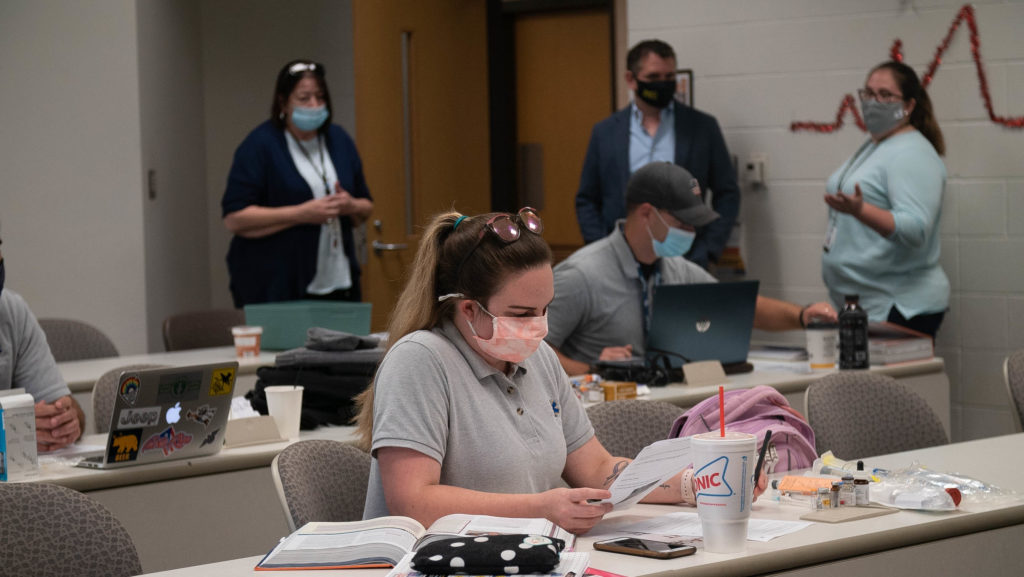
Hands-on learning is a top priority at FTCC. The college offers training through the Cisco Networking Academy, which prepares participants for a career in building and securing computer networks. The administration is working hard to create a space for interdepartmental collaboration between the Cyber Defense Education Center and health care programs with plans to run cyberattack simulations in a hospital setting.
The training center will involve renovating the former early education center into a nursing facility that will have classrooms, study rooms, simulation labs, and several fully functioning hospital suites. During the pandemic, hospitals ran out of room for patients, which inspired the institution to create space within learning facilities to help with overflow. Sorrells hopes by growing the program, it will encourage the community to think about a career in the medical field.
“This is a health care desert, and the nursing shortage is real and just getting worse,” Sorrells said.

In addition to curriculum and continuing education courses, FTCC offers a unique program focused on populations considered hard to employ, such as persons who were formerly incarcerated. Individuals participate in training, counseling, and internship opportunities, and at the end of the program, they often transition to full-time employment and continue working towards having their records expunged.
Following the light at Central Carolina Community College
Gary Beasley’s eyes light up when he talks about his students’ work in the laser and photonics — the scientific study of light — technology program. He has mentored students at Central Carolina Community College since 2001 and is the lead instructor for the department after a successful career working in the private sector.
Students learn more than theory in the department located at the main campus. Faculty guide students as they dive into the application of photonic, laser, and fiber optics principles.
Bulletin boards line the hallway and are covered in several layers of newspaper clippings that showcase student and department success. Beasley sifted through dozens of articles pinned to the wall to show the progression of a former student, Joseph Price’s, career in laser technology. Beasley recalled meeting Price when he was in middle school and attending a workshop hosted by CCCC. Price would go on to graduate from the laser and photonics technology program and is now an engineering technician at Wasatch Photonics.
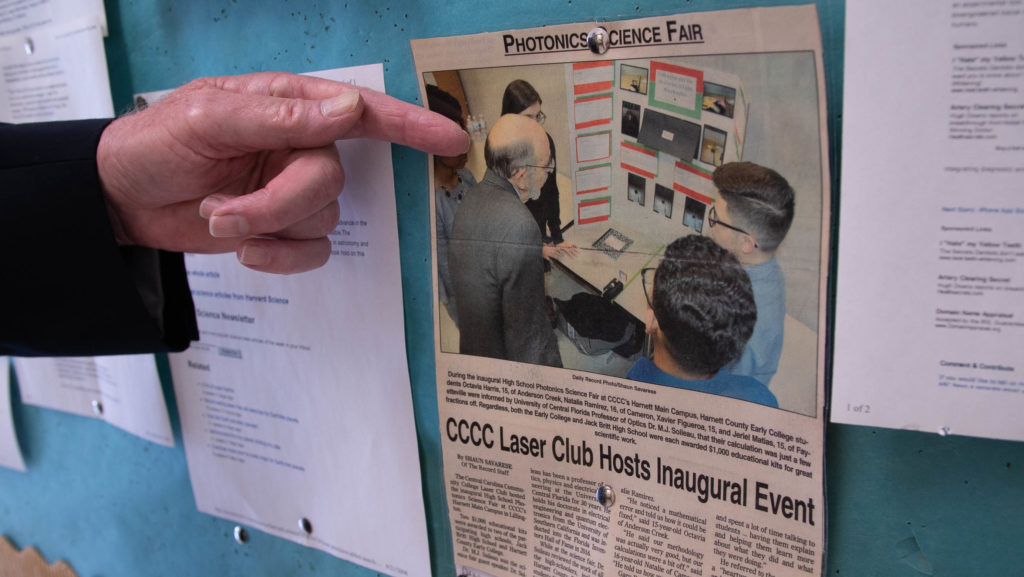
Beasley works with electronics engineering technology instructor, John LaVere, to create an environment where students are encouraged to explore on their way to success.
“A big part of the electronics courses are the hands-on aspects,” LaVere said.
A former engineer for IBM, LaVere has been teaching at the college since 2014. The classrooms are lined with electronic lab stations where students spend time running experiments and simulations when they’re not in lecture.
A ‘hidden gem’ in Harnett County
Serving Chatham, Harnett, and Lee counties, CCCC enrolled 11,900 students last year.
Logan Martin and Christine Spears are work-study students in their second year of the laser and photonics technology program and work closely with Beasley and LaVere. Spears remembers what it was like as a first-year and the challenges she faced with complex processing systems.
The instructors “do anything they can to help you learn,” she said. “It’s a great atmosphere for learning. I couldn’t feel more blessed to have this here and the people we work with. Everyone helps each other and every one is willing to put in the effort.”
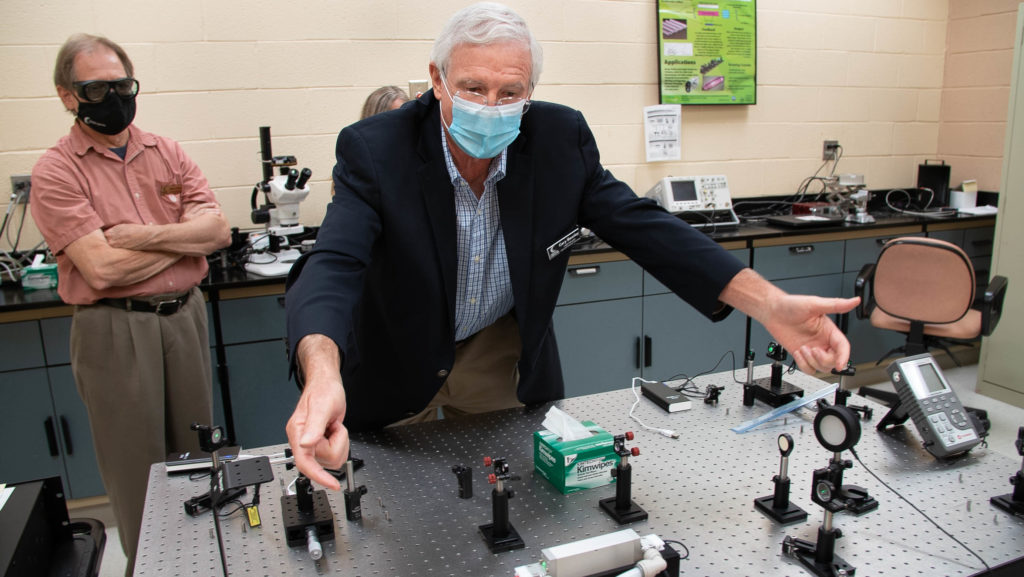
Martin is especially interested in the laser engraver that also acts as a 3D printer. Central Carolina’s Harnett County campus didn’t offer courses in the subject area, so Martin taught himself techniques that he now shares with fellow students.
Fostering a creative community is important for the instructors at the college. The collaborative experience encourages students to roll up their sleeves and work together.
“The more we learn the better it gets,” Spears said. She didn’t plan on going into photonics until the program presented itself with a vast range of possibilities, and she said she has the college to thank for that.
“It’s a little hidden gem in Harnett County,” Spears said.
Recommended reading
